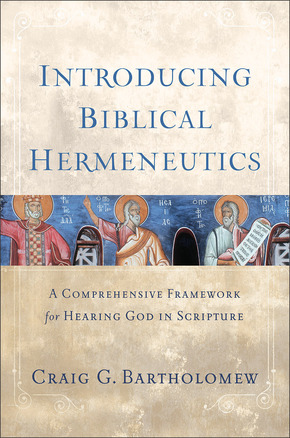Introducing Biblical Hermeneutics
A Comprehensive Framework for Hearing God in Scripture
Craig G. Bartholomew
Grand Rapids: Baker Books
ISBN 978-0-8010-3977-5
640pp; Hbk; £21.75.
Publisher's website here.
This is perhaps the best book on hermeneutics yet written! In the first chapter Bartholomew sets out his main thesis – he wants to develop a Trinitarian hermeneutic. A Trinitarian hermeneutic, according to Bartholomew, is one which:
1. Approaches the Bible as authoritative Scripture
2. Approaches the Bible as a whole
3. Views ecclesial receptions of Scripture as primary
4. Exists and humbles academic interpretation
5. Will attend to the discrete witness of the Testaments
6. Rightly discerns the goal of reading the Bible
7. Does not close down but opens up interpretation of the Bible
8. Takes up God’s address for all of life seriously
It is perhaps point 8 that mark this introduction out as being different. Bartholomew writes out of a Kuyperian tradition and this permeates all of his approach. This is particularly seen in the inclusion of two chapters - not usually seen in a hermeneutics book - one on the Bible and scholarship and the other on preaching. But also in two key themes that reoccur the role of philosophy and the emphasis on the goodness of creation. As regards the latter point he rightly points out that:
‘Methods are never philosophically and theologically neutral, and we should avoid uncritically importing methods of interpretation that at root are in epistemological conflict with the epistemic primacy of the Trinity.’
And
'A distinctive of this volume is its insistence that theology and philosophy cannot be bracketed out of biblical interpretation.'
Though, this does not mean that all biblical scholars have to have philosophy degrees! (Though one might help!)
Sadly, it has become common over the past 150 years for Christian scholars to inhabit two unrelated worlds: the world of the church, and the world of their study and lecture room. In the one, Christ is acknowledged; but in the other, Christ is unwelcome, since in the latter domain so-called reason and neutrality reign.
This sort of approach has led to dualism and a privatisation of faith.
The book is divided into 5 parts: Approaching Biblical Interpretation, Biblical interpretation and biblical theology, the story of biblical interpretation, Biblical interpretation and the academic disciplines, the Goal of biblical interpretation.
What is refreshing about this book is that it takes seriously the need to listen as well as analyse and interpret. The emphasis is on listening to God; he proposes Mary, Martha’s sister as the patron saint for biblical interpretation –she quietly and attentively listened to Jesus. Listening is part of us ‘being creaturely’. Listening provides an antidote the Enlightenment legacy of the emphasis on rational analysis. He notes that: ‘prior to analysis comes listening’.
Bartholomew draws on a wide range of sources in one chapter we have a range of quotes from as diverse authors as John Stott, Martyn Lloyd-Jones, Karl Barth, George Steiner, Herman Bavinck, Lesslie Newbigin, Tocqueville, Mariano Magrassi and Jean Leclercq. This does not mean that Bartholomew takes a pick and mix approach – he is not ashamed to draw upon resources from other traditions and there is richness in such diversity.
He identifies that one issue has been that academic scholars compartmentalise – so that in the church the lordship of Christ is acknowledged, but in academic study he is not, as reason and neutrality reign. This dichotomy, Bartholomew is right, is unsustainable. What is needed and is a full integration of the ecclesiastical and academic interpretation. This can only come from seeing the Scripture as God’s Word.
The book has a plethora of references over 2300 and a massive bibliography - about 40% of the book is taken up with references and bibliography. That shows the scope of Bartholomew’s research. It also serves to show that this is no mere introduction but is comprehensive.
This book shows that hermeneutics does not need to be a dry and dusty subject - Bartholomew shows that it can be helpful and engaging. The penultimate chapter is particularly inspiring as here Bartholomew plus together most of the threads and shows how in they can be applied to the book of Hebrews in an inspiring and insightful way. This chapter alone is worth the price of the book - and to reiterate my first sentence: this is probably the best book on hermeneutics yet written.
Contents
Part 1: Approaching Biblical Interpretation
1. Biblical Interpretation Coram Deo
2. Listening and Biblical Interpretation
Part 2: Biblical Interpretation and Biblical Theology
3. The Story of Our World
4. The Development of Biblical Theology
Part 3: The Story of Biblical Interpretation
5. The Traditions within Which We Read
6. Early and Medieval Jewish Biblical Interpretation
7. Renaissance, Reformation, and Modernity
8. Canon
Part 4: Biblical Interpretation and the Academic Disciplines
9. Philosophy and Hermeneutics
10. History
11. Literature
12. Theology
13. Scripture and the University: The Ecology of Christian Scholarship
Part 5: The Goal of Biblical Interpretation
14. The "Epistle" to the Hebrews: But We Do See Jesus
15. Preaching the Bible for All It's Worth: The Resurrection of the Sermon and the Incarnation of the Christ
Indexes


No comments:
Post a Comment